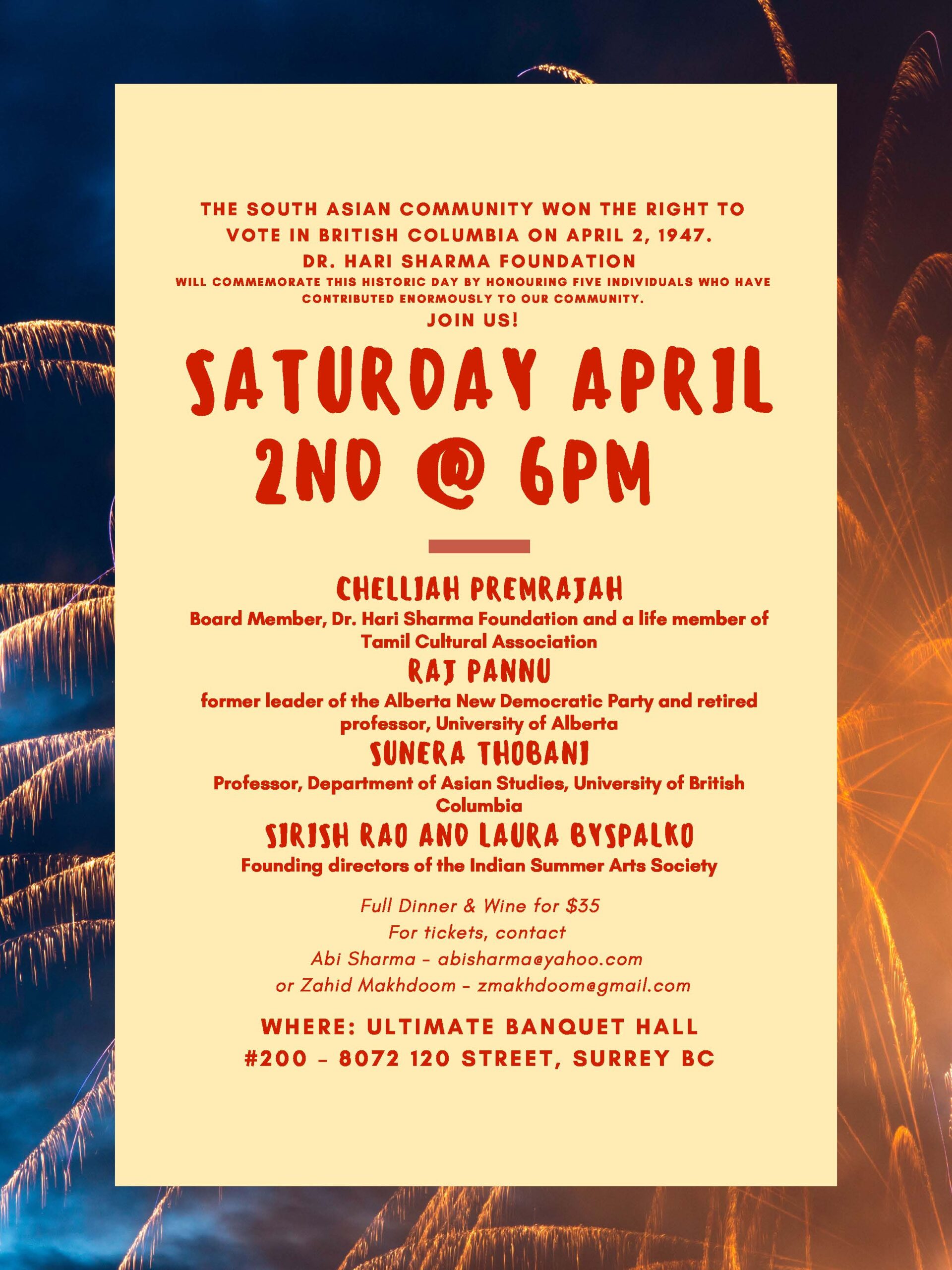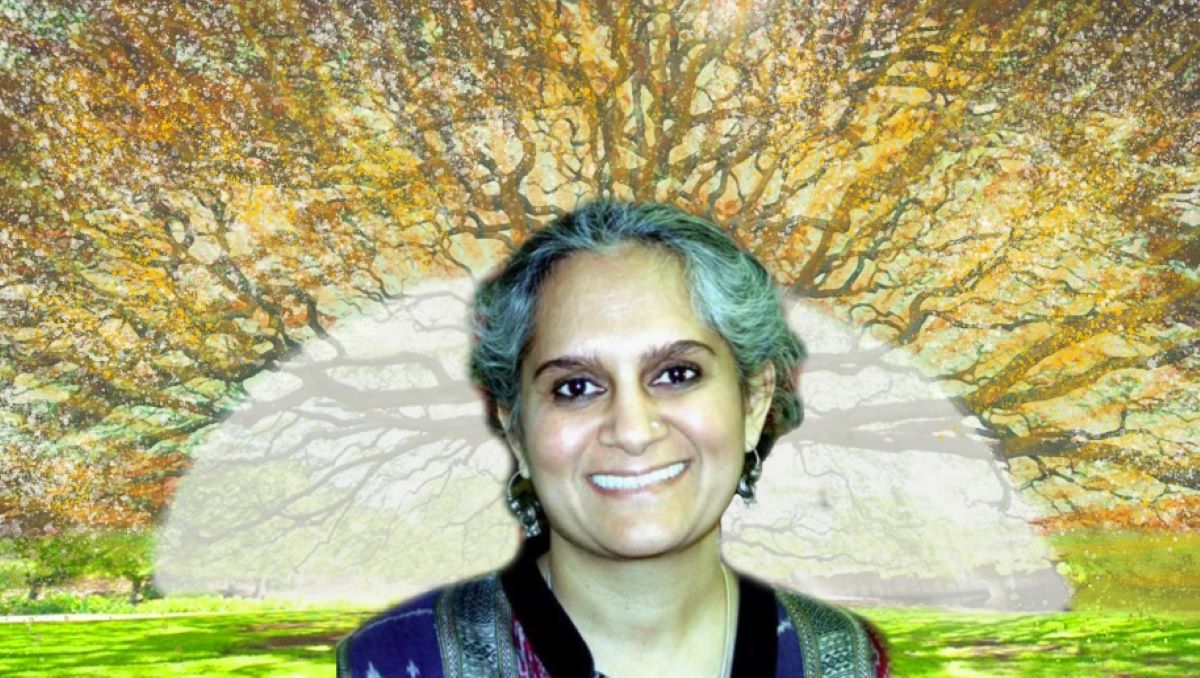
Surrey, BC
The South Asian community won the "right to vote" in British Columbia on April 2, 1947. Dr. Hari Sharma Foundation commemorated this historic day at an event on April 2, 2022, in Surrey, British Columbia by honouring five individuals who have made significant contributions to our community. They are: Chelljah Premrajah, Board Member, Dr. Hari Sharma Foundation and life member of the Tamil Cultural Association; Raj Pannu, Former Leader of the Alberta New Democratic Party and retired Professor, University of Alberta; Sirish Rao and Laura Byspalko, Founding Directors of the Indian Summer Arts Society; and Dr. Sunera Thobani, Professor, Department of Asian Studies, University of British Columbia.
Dr. Sunera Thobani was one of the keynote speakers on the April 2nd event. Her scholarship is located at the intersection of the Social Sciences and Humanities. She studies and works on critical race, postcolonial, transnational and feminist theory; South Asian women’s, gender and sexuality studies; representations of Islam and Muslims in South Asian and Western media; Muslim Women, Islamophobia and the war on terror; intersectionality, social movements and critical social theory; colonialism, indigeneity and racial violence; and globalization, citizenship and migration.

Keynote Speech by Dr. Sunera Thobani:
“Land acknowledgement – On Indigenous territories
My deepest thanks to the Hari Sharma Foundation for the honour you have done me today, I am very, very pleased to be part of this event, along with the other honourees.
It is important that we take the time to celebrate our communities’ achievements – winning the right to vote in 1947, in what was founded as a ‘white man’s’ country, was no small task for South Asians and other racially minoritized communities. These communities were denied political rights because of their race. The accomplishments of our communities then, and since then, have brought about necessary change in this settler society.
However, even as we celebrate these moments, it is important that we not forget the challenges that we face in the present, or those that lay ahead of us. The times we live in are volatile, this is a time of great change. We are seeing the remaking of the international order, and re-drawing of the racial lines that are foundational to this order, as they are to Canada. This order is everywhere collapsing around us. The climate crisis, the COVID-19 pandemic, the ever-expanding wars around the world, the rise of ultra-nationalist and white supremacist forces, the refugee crises, all are events that point to a global order in crises. The old order – in place since the mid-twentieth century – is being unmade, almost by the day. What will emerge in its place is not yet clear. It is the demand of this time that we understand these momentous transformations – we are called to draw on the lessons of our histories, of past struggles, as we look to build a just future.
The war on terror transformed the political landscape, across the West as well as in the rest of the world. Islamophobia became pervasive, and the demonization of Islam and Muslims became the basis for the elevation of western culture, its norms and practices, as superior. Western liberal-democracies became equated with the idea of human freedom.
If in the US, nationalism has taken a rampantly white supremacist form, Canadian nationalism has also shifted to the right in this period. In Canada, the invasions, occupations, killings and torture of the global were redefined as humanitarianism. Canadian pride in multiculturalism now coexists with the public endorsement of Canadian culture as superior in relation to the ‘fanaticism’ of Islam and Muslims. This discourse has legitimized violence as the only means of governance of Muslims. US exceptionalism resurrected the idea of western superiority in that country, Canadian humanitarianism upholds this idea in this country.
US white nationalism and Canadian multiculturalism interact with, shape and uphold each other. Together, they create the meaning of the West, and of to its racial-imperial politics.
In Canada – still a white settler society, the violence against, and dispossession of Indigenous peoples remains ongoing. The present nationalist project of reconciliation seeks to integrate Indigenous peoples into the Canadian state. This racialization of Indigenous peoples is accompanied by the construction of Black peoples as less than human, and of Asians as racially degenerate and aliens to western morality. Historically, Indigenous genocide, and the labour of Black and Asian peoples, was vital to the development of Canada’ national economy, which like that of the US, was reliant on colonialism, slavery and indentureship. So today if we think of ‘race’ as a form of discrimination or the result of prejudice and ignorance, we miss the point that race shapes the global political economy, that capitalism has always been racial capitalism, and that race shapes the psychological and social formation of whiteness.
It is important, to learn from our history. Our communities won the right to vote in the context of the international changes brought about by anti-colonial and anti-racist movements of the mid-twentieth century. Canada and the US were compelled to change by these movements. Both countries responded with the emergence of a racial liberalism that offered inclusion to communities of colour, that opened up immigration from the newly independent Third World countries. The need for labour was acute in North America at this time, as it was in Europe. Canada relied on immigrant labour, indeed it still does. Yet Canada was also committed to preserve its bi-lingual and bi-cultural – British and French – character. Hence even as our communities won the vote, won increased access to education, to the professions, to citizenship – people of colour were nevertheless categorized as ‘immigrant communities’, as ‘visible minorities’ and as ‘newcomers’.
In this situation, Multiculturalism fixed the idea that people of colour were distinguished by, could be reduced to, their cultural difference. Race was now coded as culture so that the term ‘Immigrant’ acquired a racial meaning. Hence, even the second and third generations in our communities are categorized as immigrants, as visible minorities, as newcomers. Multiculturalism is the official language of race in Canada, it organizes this society’s racial politics and hierarchies. Multiculturalism also allows the Canadian nation to be presented as ‘beyond’ race. Canada presents itself as such even in a moment where the discourse of Islamic ‘cultural barbarism’ justifies and legitimates the country’s imperialist wars.
Multiculturalism, as a state supported form of ‘anti-racism’ – denies the reality of racism even as the racial hierarchy that shapes the workplace; access to education, healthcare and social services; treatment by the police and other institutions of the state. remains in plain sight. The promise of inclusion exists alongside the actuality of racial violence, anti-Black and anti-Indigenous violence; alonopenedi-immigrant and anti-refugee sentiments; alongside the cheapening of immigrant and migrant labour, of front-line workers in the pandemic, and of international students. This is what race looks like on the ground – to focus on racial discrimination and individual prejudice when discussing race- is to see only the tip of the iceberg.
This assimilation of ‘anti-racist’ politics into liberal languages of multiculturalism has marginalized Black, Indigenous and other anti-racist and anti-colonial movements. Multiculturalism displaces demands for racial justice, for end to racial violence, for Indigenous sovereignty. Instead, multiculturalism shifts the focus to cultural difference. The solution offered to racial violence and injustice is more tolerance, better intercultural communication, celebration of the song and dance version of culture. The promise of inclusion, of justice, is thus permanently deferred.
Yet even this multiculturalism/ racial liberalism management of global and national politics has reached its limits. Even as the project of decolonization in the Third World remains incomplete, the ‘crisis of white supremacy’ has overtaken global politics. The war in Ukraine demonstrates to us daily how war in Europe and European refugees are distinguished from wars in the Middle East and Africa, of refugees fleeing the global war on terror.
Certainly, our communities won an expansion of liberal rights, there was the decline of legislated racial discrimination and segregation, the opening up of immigration.
Yet Multiculturalism has had an integrationist impact on our communities. In the process of using the advances we have won, the vision of a fundamental transformation of colonial and imperialist societies, of revolutionary transformation in Canada and of the global economy, a transformation in how wealth and power are distributed – in short, the vision of racial and economic justice has lost ground.
The war on terror, the COVID-19 pandemic, the rise of ultra-nationalist and even fascist movements and leaders are bringing about the erosion of the liberal-democratic institutions that promised communities like ours a measure of inclusion. All the while, racial neo-liberalism is deepening and broadening economic inequality within the west, and between the Global North and South. COVID has laid bare these stark inequalities.
Today, the climate crisis is escalating all around us. Wars and violence have thrown the international order into upheaval. Changing these conditions, the responsibility to fight for a better future, for racial justice for all of humanity, is as much in our hands as in any other hands.
Thank you.”

